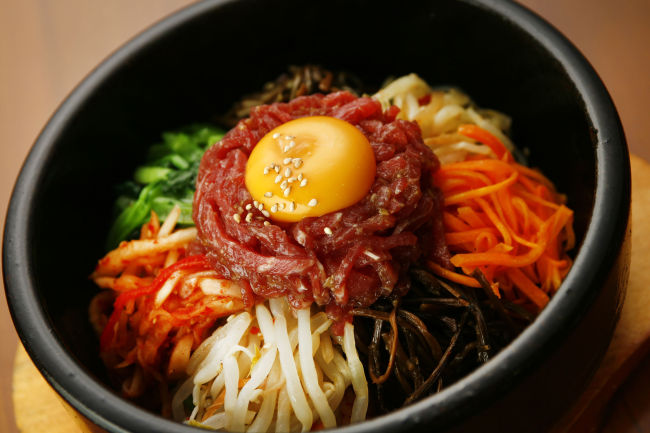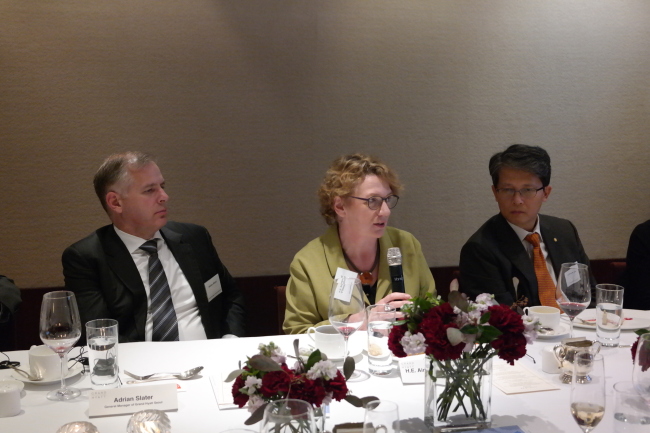Small things to tweak for tourists
Web-surfing, eating, getting around -- a number of minor but tangible obstacles still hold tourists back from a fully immersive Korean experience
By KH디지털2Published : Nov. 6, 2015 - 19:01

Surfing the web, figuring out directions and finding a place to eat -- these essential, day-to-day activities are things that foreign tourists still find difficult to tackle during their stay in Korea, said members of the 5.4 Club, a network devoted to promoting Korean culture abroad, during its regular meeting Thursday night.
Despite the expansion of the tourism industry here, a number of seemingly minor but tangible obstacles hold tourists back from getting a full, immersive experience of Korean culture, said the attendees, who consisted of various prominent members of the business and culture community.
According to Lee Jai-wook, an attorney at law firm Yulchon and legal adviser to the club, there is still a significant shortage of English-language information on the Internet, somewhat in contrast with the nation’s ultrahigh-speed, ubiquitous Wi-Fi network.
“For tourists to fully enjoy the sights, food, shops and joys of Korea, relevant information has to be delivered to them,” said Lee. “But our Internet is not fully globalized, so it’s difficult even for foreigners residing in Korea to get information online.”
Additionally, despite the overseas demand for Korean online products, Lee said, consumers are unable to make purchases due to the inconveniences the current Korean Internet system poses to foreigners.
For example, this August, when the Korean TV drama series “My Love From the Stars” hit it big with audiences throughout Asia, there was massive demand among Chinese consumers for a coat lead actress Jun Ji-hyun sported in the series -- a demand that went by largely unfilled because of the complicated payment system, high delivery fees and language barriers.
“The government consequently eased regulations to allow easier access,” said Lee, referring to the removal of the Active X online payment system. “But there are still a lot of obstacles, and not enough English-language sites.”

Kwon Heon-jun, chief operating officer of modern Korean restaurant Congdu, addressed the need for more English-language menus and thorough information on the ingredients, cooking process and philosophy that goes behind Korean cuisine.
“A lot of the times, at our restaurant, foreign visitors are very curious about the food and the story behind it,” he said. “They ask a lot of questions about the contents, how it’s prepared, whether there are any ingredients they are allergic to and so on.”
But very few restaurants have staff that can explain the details of each dish in English or provide menus with English-language descriptions, said Kwon, who emphasized the need for governmental efforts in this area.
Foreign tourists also face difficulties in navigating the city, said Adrian Slater, general manager of Grand Hyatt Seoul.
“I go up to Mount Namsan every day, and the Seoul City Wall goes right through it. It’s beautiful, but there are no signposts there,” he said, indicating that foreigners unfamiliar with Korea would have trouble understanding what it is or even discovering the noteworthy site.
“There’s a big market that’s very interested in the historical sites of Korea,” Slater said. “And I think a lot of information is readily available in the Korean language, but not in German, French or other languages that have a lot of impact on Korea.”
Slater suggested that with Korea’s already established mobile infrastructure and technology, this void could be filled with the development of tourist-friendly information platforms.
“It can be done relatively easily with mobile apps, for example,” he said. “Korea already has incredible Internet. It’s all there, it’s just a matter of using it. ... There’s so much to discover here, if we promote it the right way.”
By Rumy Doo (bigbird@heraldcorp.com)












![[Today’s K-pop] BTS pop-up event to come to Seoul](http://res.heraldm.com/phpwas/restmb_idxmake.php?idx=644&simg=/content/image/2024/04/17/20240417050734_0.jpg&u=)




![[KH Explains] Hyundai's full hybrid edge to pay off amid slow transition to pure EVs](http://res.heraldm.com/phpwas/restmb_idxmake.php?idx=652&simg=/content/image/2024/04/18/20240418050645_0.jpg&u=20240419100350)

